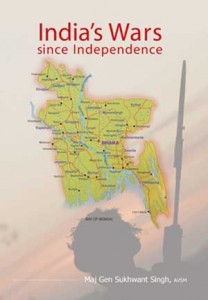The chapter regarding prisoners closed with the repatriation of the last group at Wagah on 29 April 1974.4 Gen Niazi was the last of them to leave Indian soil and was seen off with due ceremony by Indian military commanders. According to conservative estimates, India spent about Rs 350 million on the upkeep of the prisoners.
Notes:
- Asian Recorder, Vol XVIII, No 52, p. 11148.
- Asianr Recorder, Vol XX, “Recognition of Bangladesh,” p. 11903.
- Asian Recorder, Vol XX, No 19. “Tripartite Agreement on Exchange of POWs,” p. 11985.
- Asian Recorder, Vol XX, No 21, “Repatriation of POW’s Completed,” p. 12011.
Bhutto went to Simla as the head of a defeated nation. Half his country was irrevocably lost and about 5,500 square miles in the other half were under Indian occupation. More than 90,000 Pakistani soldiers were languishing in India as prisoners of war as opposed to no more than 700-odd Indian prisoners in Pakistan. India held such an advantage as a victor nation that Bhutto’s detractors felt that India was in a position to dictate terms of peace to Pakistan. Some arrogant opponents of Mrs Gandhi in India also suggested that the fruits of victory must be extracted to the maximum in the way of war reparations, 1 hat the Kashmir problem should be solved permanently and the international border adjusted to make it more defensible.
Click to buy: India’s wars since independence
In the end, it must be said to Bhutto’s credit that he won what his armies had lost on the battlefield with patient and shrewd diplomacy. When the last prisoner returned to Pakistan he boasted: “I promised to get the occupied territory vacated by India. I did that. I promised to get the prisoners back. Although it took some time, I got them back, and I even stopped the infamous war trials. I have stabilized the line of control in Jammu and Kashmir without compromising on the main issue.” As for recognizing Bangladesh, he said, “it was only a question of legalizing the existence of a reality, but it was done at a moment of our choosing and not at anybody’s dictation.”
Bhutto said: “I have stabilized the line of control in Jammu and Kashmir without compromising on the main issue.”
As for using the trained manpower released by repatriation, Tikka Khan had had his own views, which he expressed in an interview with the West German television network in July 1973. He said: “When they come back, we will treat them as heroes. We will try and counter-brainwash them. Then we will send them to see their relations. Then we will reactivate their formations.”
He continued, “… in East Pakistan, they have surrendered in units and formations, so we will reactivate their units and formations. Of course, if at any stage we find that their loyalties have been affected, we will take other action in that respect… Some of them may not be fit for further service. In that case we will probably retire them. As regards their promotions, well, they will take their place according to seniority, provided of course that they are cleared for promotion.”
Although the shortfall in numbers created by the loss of the formations in former East Pakistan have been more than amply made up, those units and formations to which the prisoners belonged have not been reactivated. If we tried to soften the attitude of the prisoners towards their captors, this appears to have been interpreted as a sign of inherent Indian weakness. If their Indian captors sermonized on the benefits of democracy as evidenced by their humane treatment, and this contrasted with the ills of military dictatorship, they were wasting their sermons as the products of the military junta, who enjoyed all the privileges of rulers, could not reconcile themselves to a democratic regime. If Indians tried to sell their economic development, the prisoners could easily point to the abject poverty that still stalked the Indian countryside. They could perhaps be impressed by the comparative freedom of our press, but that does not wash brains. Tikka Khan did not fear on that account.
Bhutto appointed a commission presided over by a judge to inquire into the circumstances of the military debacle and apportion blame where necessary. The commission’s proceedings are reported to have been completed after hearing the statements of returned prisoners of war. The findings have not been made public, but these are probably no different from those given by Fazal Muqeem in The Crisis of Leadership. From recent senior appointments in the Pakistan Army it appears that those cleared have been rehabilitated and promoted. In this regard, the appointment of Maj Gen Nazar Hussain Shah as Quartermaster General and the promotion of Brig Tajumul Hussain as Major General in command of a division are significant. Presumably, some assimilation has been effected in the lower ranks as well. And Niazi and others like him must have got their home orders without undue publicity.





